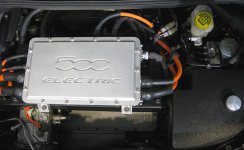- Joined
- May 15, 2011
- Messages
- 3,769
- Points
- 568
I got into a Nissan Leaf at a 'poor cousin' of the UK Chelsea Gardens last Sunday and from having a good chat with the rep from Nissan (he was very knowledgeable) - I realised that
1. Technology is there and it's 'big' - reckon that it would be a tight squeeze to make it fit into a 500.
2. The promise of the hybrid 500 given that the TA engine is small allows room for a 'wee' battery to 'help' power the car in the engine bay.
http://www.autoexpress.co.uk/news/autoexpressnews/254401/fiats_hybrid_500_charges_up.html
3. The power from a battery should be great 'off the line' and would reduce the 'real world' fuel consumption for an 'urban' car.
4. Topolino model - will this ever appear ? A lot of articles going way back
http://www.worldcarfans.com/1080708774/fiat-topolino-spy-photos
and it refers to using this 'new' engine if it ever appears. The lighter a car gets - the better for mpg - most cars these days seem to be gaining weight with all the regs for safety, etc - just look at the US 500 model.
5. Even the likes of BMW are bringing in technologies like brake-energy-regeneration (it might help the S/S )
)
http://green.autoblog.com/2007/03/27/new-bmw-m3-v8-engine-features-brake-energy-regeneration/
I read some figures last day that Electric cars with their zero emissions had a real emission figure of around 105grs/km but if you use 'night time saver' electricity it drops to 80grs/km. So if the hybrid 500 makes an appearance it beats / competes with the electric 'tree huggers'.
Does anyone really know what's in the pipeline in relation to the 500 / Topolino hybrid models ?
1. Technology is there and it's 'big' - reckon that it would be a tight squeeze to make it fit into a 500.
2. The promise of the hybrid 500 given that the TA engine is small allows room for a 'wee' battery to 'help' power the car in the engine bay.
http://www.autoexpress.co.uk/news/autoexpressnews/254401/fiats_hybrid_500_charges_up.html
3. The power from a battery should be great 'off the line' and would reduce the 'real world' fuel consumption for an 'urban' car.
4. Topolino model - will this ever appear ? A lot of articles going way back
http://www.worldcarfans.com/1080708774/fiat-topolino-spy-photos
and it refers to using this 'new' engine if it ever appears. The lighter a car gets - the better for mpg - most cars these days seem to be gaining weight with all the regs for safety, etc - just look at the US 500 model.
5. Even the likes of BMW are bringing in technologies like brake-energy-regeneration (it might help the S/S
http://green.autoblog.com/2007/03/27/new-bmw-m3-v8-engine-features-brake-energy-regeneration/
I read some figures last day that Electric cars with their zero emissions had a real emission figure of around 105grs/km but if you use 'night time saver' electricity it drops to 80grs/km. So if the hybrid 500 makes an appearance it beats / competes with the electric 'tree huggers'.
Does anyone really know what's in the pipeline in relation to the 500 / Topolino hybrid models ?
Last edited:


